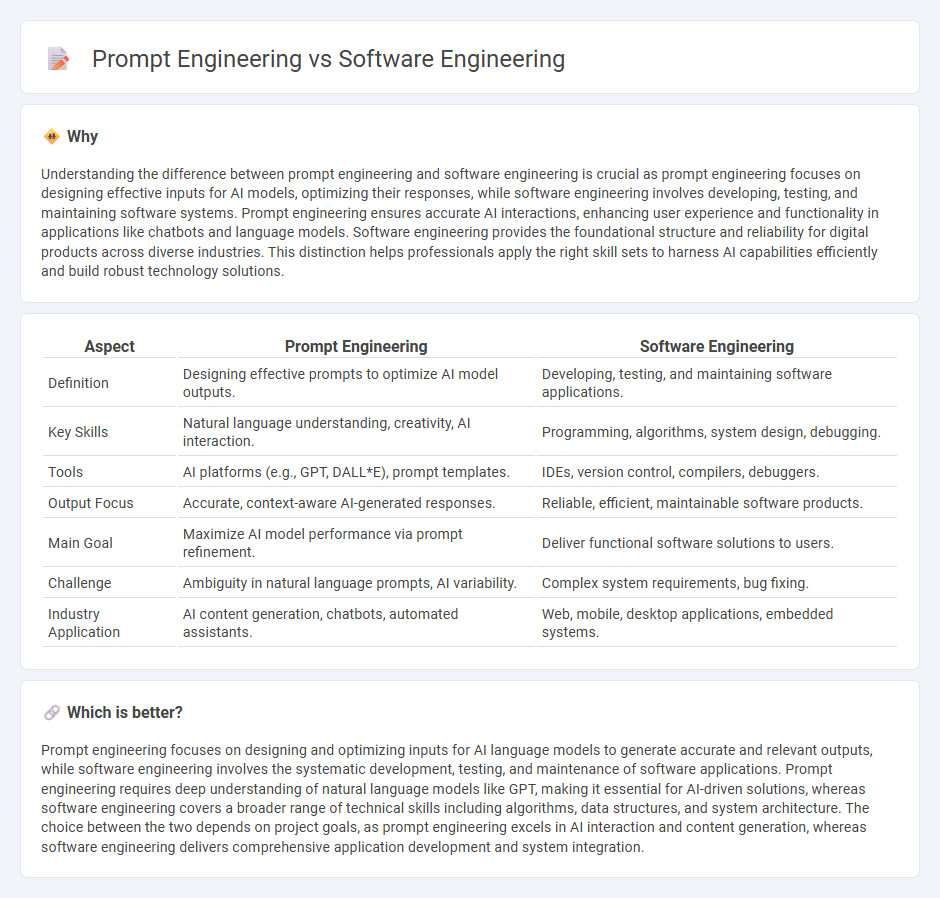
Prompt engineering focuses on designing and refining inputs to optimize AI model outputs, leveraging natural language understanding and machine learning principles. Software engineering involves developing, testing, and maintaining software systems using programming languages, algorithms, and software development methodologies. Explore the distinctions and applications of prompt engineering and software engineering to enhance your technology expertise.
Why it is important
Understanding the difference between prompt engineering and software engineering is crucial as prompt engineering focuses on designing effective inputs for AI models, optimizing their responses, while software engineering involves developing, testing, and maintaining software systems. Prompt engineering ensures accurate AI interactions, enhancing user experience and functionality in applications like chatbots and language models. Software engineering provides the foundational structure and reliability for digital products across diverse industries. This distinction helps professionals apply the right skill sets to harness AI capabilities efficiently and build robust technology solutions.
Comparison Table
| Aspect | Prompt Engineering | Software Engineering |
|---|---|---|
| Definition | Designing effective prompts to optimize AI model outputs. | Developing, testing, and maintaining software applications. |
| Key Skills | Natural language understanding, creativity, AI interaction. | Programming, algorithms, system design, debugging. |
| Tools | AI platforms (e.g., GPT, DALL*E), prompt templates. | IDEs, version control, compilers, debuggers. |
| Output Focus | Accurate, context-aware AI-generated responses. | Reliable, efficient, maintainable software products. |
| Main Goal | Maximize AI model performance via prompt refinement. | Deliver functional software solutions to users. |
| Challenge | Ambiguity in natural language prompts, AI variability. | Complex system requirements, bug fixing. |
| Industry Application | AI content generation, chatbots, automated assistants. | Web, mobile, desktop applications, embedded systems. |
Which is better?
Prompt engineering focuses on designing and optimizing inputs for AI language models to generate accurate and relevant outputs, while software engineering involves the systematic development, testing, and maintenance of software applications. Prompt engineering requires deep understanding of natural language models like GPT, making it essential for AI-driven solutions, whereas software engineering covers a broader range of technical skills including algorithms, data structures, and system architecture. The choice between the two depends on project goals, as prompt engineering excels in AI interaction and content generation, whereas software engineering delivers comprehensive application development and system integration.
Connection
Prompt engineering and software engineering are intertwined through their shared focus on optimizing computational processes and improving system interactions. Prompt engineering enhances artificial intelligence models' performance by refining input queries, which complements software engineering's goal of developing robust, efficient applications. Both disciplines drive innovation in technology by integrating natural language processing techniques with traditional software development methodologies.
Key Terms
**Software Engineering:**
Software engineering involves the systematic design, development, testing, and maintenance of software applications, emphasizing coding standards, architecture, and scalability to ensure reliable performance. It integrates principles from computer science and project management to deliver robust software solutions that meet user requirements. Explore detailed comparisons to understand the evolving roles and skills required in both software and prompt engineering.
Software Development Lifecycle (SDLC)
Software engineering centers on the entire Software Development Lifecycle (SDLC), encompassing requirements analysis, design, coding, testing, deployment, and maintenance to deliver robust software solutions. Prompt engineering, while not a traditional SDLC component, involves crafting precise inputs for AI models to optimize output quality, often integrated into development phases like prototyping and testing. Explore detailed comparisons to understand how these disciplines converge and complement each other in modern software projects.
Version Control
Software engineering emphasizes rigorous version control systems like Git to manage code changes, collaboration, and maintain software integrity throughout development cycles. Prompt engineering, while nascent, increasingly adopts version control practices to track iterations and improvements of prompt designs, ensuring reproducibility and consistent performance. Explore further to understand how these disciplines leverage version control for enhanced project management and innovation.
Source and External Links
Software Engineer | Skills and Career Paths - This resource provides insights into the role of a software engineer, including their responsibilities and career paths.
Software Engineering Tutorial - This tutorial covers the basics to advanced concepts of software engineering, including models, development life cycles, and metrics.
Software Engineering - This Wikipedia page defines software engineering as a branch of computer science and engineering focused on designing, developing, testing, and maintaining software systems.
 dowidth.com
dowidth.com